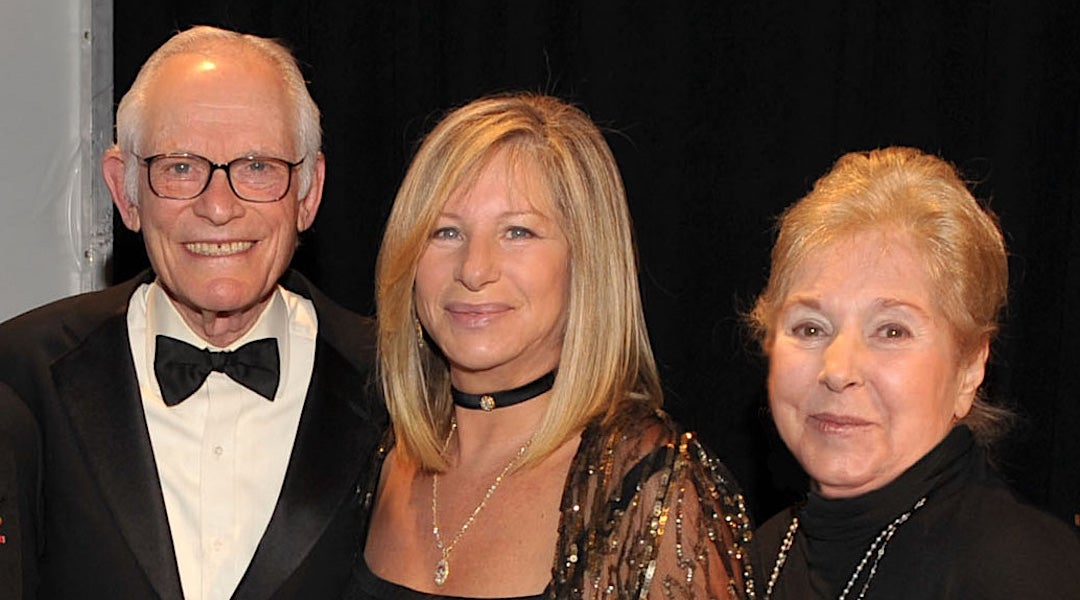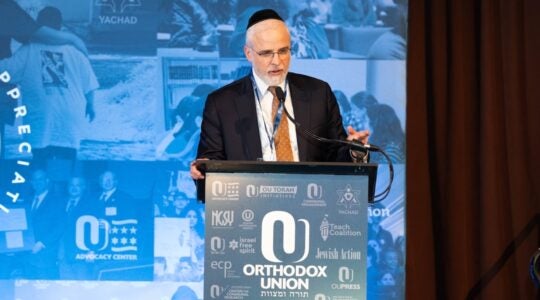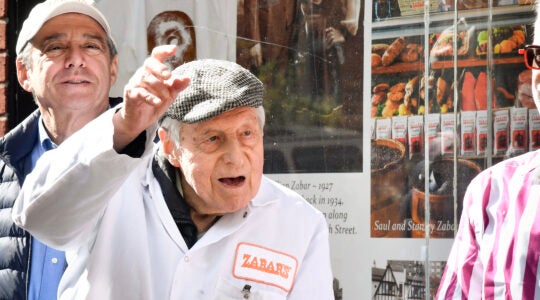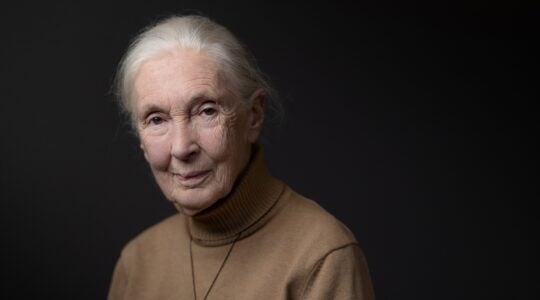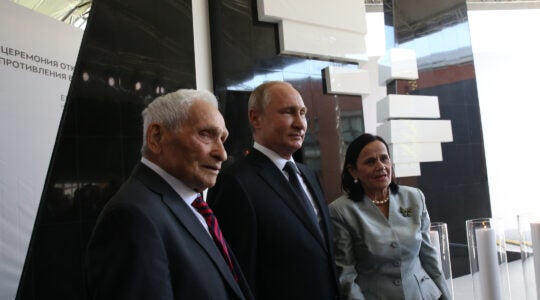Oscar-winning lyricist Alan Bergman, who with his wife Marilyn wrote the words for some of Barbra Streisand’s best-known hits as well as her 1983 film “Yentl,” died Thursday at his home in Los Angeles. He was 99.
The Bergmans were already an established lyrics-writing team when, in 1962, they met Streisand after a performance at the Bon Soir nightclub in Manhattan. It wasn’t until 1969, however, that she recorded one of their songs, “Ask Yourself Why,” for her “What About Today?” album.
What followed was a string of signature hits for Streisand — a fruitful collaboration among Brooklyn-born Jews that included “The Way We Were,” written for the hit 1973 film of the same name, and “You Don’t Bring Me Flowers,” Streisand’s 1978 duet with Neil Diamond, yet another Brooklyn Jew. In 2011, Streisand recorded an album of Bergman songs, “What Matters Most.”
In a statement Friday, Streisand recalled her collaboration with Bergman and his wife, who died in 2022 at age 93.
“Alan Bergman was not only a prolific lyricist, and incredible husband, father and grandfather, he was family to me — a father figure,” said Streisand. “We met over 60 years ago, and we never stopped loving each other and collaborating together. My last conversation with him was about a wonderful song he was working on. At 99 his creative gifts still flowed. I like to think he’s again in Marilyn’s warm embrace and I’m sure they have started collaborating again on another song! I will miss them both.”
“The Way We Were” was the top-selling song of 1974 and brought the Bergmans the second of their three Academy Awards. They previously won the Oscar for “The Windmills of Your Mind,” with music by Noel Harrison, which was heard in the 1968 film “The Thomas Crown Affair.”
In 1983, three of the Academy Award nominees for best song featured lyrics by the Bergmans, who received 16 nominations in all. That year they shared, with composer Michel Legrand, an Academy Award for Best Original Song Score for “Yentl.” That film, about a Jewish woman who poses as a man in order to learn Torah at a yeshiva in early 19th-century Poland, represented a return to their Jewish roots for the singer and the lyricists.
“When we did ‘Yentl,’ we did a lot of research,” Alan Bergman told journalist Abigail Pogrebin in an interview for her 2005 book “Stars of David: Prominent Jews Talk About Being Jewish.” The couple remembered regular sessions with a Reform rabbi and an Orthodox rabbi. “We met once a week for a year — Barbra, Alan, and I and a few other friends,” Marilyn Bergman recalled in the same interview.
In addition to their collaborations with Streisand, the Bergmans wrote the lyrics for the Frank Sinatra hit “Nice ’n’ Easy” and theme songs for the 1970s sitcoms “Maude,” “Alice” and “Good Times.” Stephen Bishop’s version of “It Might Be You,” from the film “Tootsie,” spent eight weeks in the top 40 in 1983.
Among their frequent songwriting partners was the late Marvin Hamlisch, the Jewish composer with whom they shared the Oscar for “The Way We Were” as well as three Emmy Awards. “A true master of his craft, Alan’s legacy will live on forever through his songs,” Hamlisch’s estate said in a statement.
Alan Bergman was born on Sept. 11, 1925 at Brooklyn Jewish Hospital (the same hospital where Marilyn would be born three years later). His mother, Ruth (Margulies), was a homemaker and community volunteer, and his father Samuel worked in children’s clothing sales. Bergman said he was on the receiving end of the social antisemitism of the era, and told Pogrebin about being turned away from the West Side Tennis Center in Forest Hills, New York when he applied to be a ball boy.
“Well, I had chutzpah in those days and I said [to the man in charge], ‘Well, I’m a pretty good Ping-Pong player. I’ve won a couple championships; I’m going to go to the Brooklyn Daily Eagle and tell them you won’t let me in because I’m Jewish.’” The man gave in, said Bergman, “and I was a ball boy for two years and that’s how I learned to play tennis.”
Bergman studied at University of North Carolina at Chapel Hill and earned his master’s degree in music at UCLA. He met his wife in the 1950s when they worked with the composer Lew Spence.
In “Stars of David,” the Bergmans’ daughter Julie describes her parents’ Judaism as “more political than spiritual,” although her father would often collect the broken shards of the glasses smashed at Jewish weddings and preserve them as a keepsake for the couple. She also recalled what her father said every year when they attended synagogue on the High Holy Days.
“I remember him always leaning over to me and whispering, ‘You know, Jews all over the world are doing exactly this right now,’” Julie, a writer and film producer, said.
He is survived by his daughter and his granddaughter, Emily Sender.
JTA has documented Jewish history in real-time for over a century. Keep our journalism strong by joining us in supporting independent, award-winning reporting.
